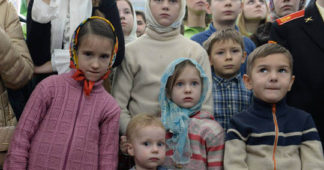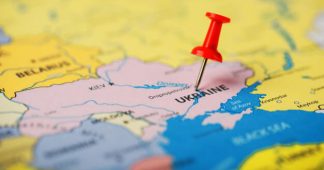Mar 21, 2022
As the Russia-Ukraine conflict continues, the internet has seen a surge in hate speech and even death threats against Russians, much of which is manufactured or spread by media outlets or opinion leaders, observers found. Last week, Ukrainian TV host Fakhrudin Sharafmal on his show cited Nazi war criminal Adolf Eichmann calling for extermination of all Russians including children, and his Fascist speech caused widespread concern and panic, especially among many Russian civilians.
Within this growing anti-Russian movement, the Global Times found that some Western politicians, media personalities, and internet influencers, who once used buzzwords like “human rights” and “anti-violence” with great frequency, have joined in the hatred free-for-all peppered with personal attacks and violent intimidation. Ironically, Western human rights nongovernmental organizations (NGOs), and major social media platforms that claim to say no to hate speech, are condoning or even encouraging extreme hate speech against Russians.
This campaign of spreading hate speech against Russians, along with a raft of sanctions from Western countries, is entirely “against humanity,” showing the double standards by the West when faced with different issues, Zhang Shengjun, a professor of international relations at Beijing Normal University, told the Global Times on Sunday.
The spreading of hatred
According to Russia Today, in a video of Sharafmal’s appearance on a Radio 24 morning show on March 12, Sharafmal reported on his program about the death of a Ukrainian marine officer and then got emotional during the broadcast, quoting Adolf Eichmann, a notorious Nazi German SS officer, calling for a “genocide” against Russia.
Eichmann played a key role in establishing the Nazi concentration camp during World War II and was largely responsible for implementing the “Final Solution” in the Jewish holocaust.
The day after the controversial segment aired, Sharafmal appeared on the same show as normal. He made a short public apology on the show, during which time the hostess laughed uncontrollably.
Sharafmal’s perfunctory apology has caused great dissatisfaction among netizens. On Twitter, the top comments on the apology video overwhelmingly blamed Sharafmal. “He didn’t even apologize sincerely, he just read the script without emotion,” one netizen commented. “It’s too late to apologize, everyone already knows your true feelings,” another one said.
The Moscow-based newspaper Komsomolskaya Pravda described Sharafmal as a “mad Nazi obsessed with murder.”
On March 15, former Russian Duma member Ilya Ponomarev revealed on social media that Sharafmal had been specially trained to broadcast negatively about Russia, but his comments were in direct violation of Ukraine’s law on disallowing fascist propaganda.
However, on the same day, Andreyko Roman Bohdanovych, a co-owner at Radio 24, also publicly apologized, but stressed that Sharafmal had spoken out of sadness, accusing the Russian side of taking it out of context as evidence that “Ukrainians practice Nazism.”
European politicians have repeatedly asserted that the threat of Nazism in Ukraine is insignificant, Russia’s RIA Novosti news agency noted in its report on March 15.
Observers pointed out that many Western anti-Russia forces are not only ignoring the growing tide of extreme rhetoric against Russia, but are also contributing to this wave of public opinion and propaganda.
In February, US representative Eric Swalwe said on the CNN Newsroom that kicking Russian students out of US universities should be “on the table” in response to Russia’s military operations in Ukraine.
Another US congressman, Ruben Gallego, said on Twitter that Russians studying in the US “are the sons and daughters of the richest Russians” as he claimed the world was condemning Russia, reiterating that “A strong message can be sent by sending them home.”
“The vulgarity of this emerging tribalism is evident in the fact that many of the people and institutions being condemned are themselves critics of the Russian government,” US media outlet MSNBC reported.
With such extreme rhetoric, people have found that offline violence against Russians has begun to spread in the West. In February, a Russian restaurant in Washington DC was vandalized twice in the short span of a weekend. Local police said that the vandals broke windows and spray painted “anti-Russian” slogans on the building.
Since the start of the Ukraine crisis, Germany’s federal police has registered hundreds of hate crimes against Russians, including online attacks, property damage, personal insults, and even threats to Russian people’s lives on the streets, German local media Berliner Zeitung reported.
The extreme hate speech that is almost ubiquitous online and offline has made Russians anxious and scared. “My female Russian friend got randomly cursed and shouted at while walking in Tbilisi,” wrote Twitter user “Kirill Shamiev” on March 14. “Stop doing this, people, we are literally one stab away from open hate crimes.”
“To be honest, I don’t know how to be Russian when this is all over,” another user wrote in Russian on March 19. “You are literally hated by absolutely everyone, including other Russians. The most despised nation and I happened to be born in it.”
Who is condoning hatred?
During the current Russia-Ukraine tensions, users of some major social media platforms, particularly those who are based in Ukraine or its surrounding regions, might have found that they seemed free to curse or lash out at Russians, although that went against the “no hate speech” policy promoted by the platforms.
Meta Platforms made a “temporary change,” allowing Facebook and Instagram users in some countries to “call for violence against Russians and Russian soldiers” in the context of the Ukraine crisis, Reuters reported on March 10, citing the “internal emails” it saw that day.
According to one of the emails, the change on calls for violence to Russians applied to Armenia, Azerbaijan, Estonia, Georgia, Hungary, Latvia, Lithuania, Poland, Romania, Russia, Slovakia, and Ukraine, Reuters said.
Russia’s embassy in the US responded the following day, demanding (US) authorities stop extremist activities of Meta and bring the perpetrators to justice. “Users of Facebook and Instagram did not give the owners of these platforms the right to determine the criteria of truth and pit nations against each other,” its Twitter account stated.
Russia’s Investigative Committee opened a criminal case against Meta Platforms accusing the company’s employees of “illegal calls for murder and violence” against Russian citizens, according to a statement released on the committee’s website on March 11.
Meta Platforms’ indulgence of hate speech sparked wide criticism. “So, Facebook and Instagram users are now allowed to call for people to be killed – but only if the people they’re wishing death upon are Russian,” said an article titled The double standards of Facebook’s ‘death to Russians’ policy published in British magazine The Spectator.
“What about the 20 million Iraqis who use Facebook?” the article asked. “If they’re still feeling aggrieved by the disastrous American invasion and occupation of their country, can they say ‘Death to US troops’? ‘Death to Joe Biden’? ‘Kill Kamala’?”
Many so-called Western human rights groups, which initiated activities including the “No Hate Speech Movement” and kept repeating slogans like “hate speech is not free speech,” have seemingly turned a blind eye to Meta Platforms this time, observers found. Human Rights Watch (HRW), an NGO that claims to be “independent” and “objective,” mentioned Meta Platforms’ policy change in the Ukraine crisis in its March 16 report, but contained no criticism with regards to the policy change. Instead, it stressed “serious violations by Russian forces” in the report.
Meanwhile, US media website Intercept in February revealed that Meta even allowed its users to praise Ukrainian neo-Nazi military unit Azov Battalion to “defend against Russian invasion.” According to the Intercept, the Azov Battalion was previously banned from being freely discussed under the company’s Dangerous Individuals and Organizations policy.
By brainwashing and utilizing social media influencers, the US government has also actively engaged in the online propaganda campaign against Russia and its people. According to US media, the White House hosted 30 TikTok stars on a Zoom call earlier this month, touting US strategic goals, policies, and stance on the Russia-Ukraine conflict. Several influencers said they felt “more empowered to debunk misinformation and communicate effectively about the crisis” after the call, The Washington Post reported on March 11.
“The White House should not be trying to influence TikTok creators. But beyond that, most of the influence of TikTok and YouTube creators, wherever creators, is done with propaganda,” Camp told the Global Times. “It doesn’t have to be a meeting at the White House for these influencers and content creators to have been manipulated into believing something that is not true so that they continue to create content that will benefit the US empire.”
The current campaign against Russia, which is largely being ignored by Western human rights organizations, shows the hypocrisy and double standards promoted by these organizations. The slogans they advertise as “human rights,” “anti-hate,” and “anti-war” are biased and carefully selected, observers said.
“These so-called NGOs, since the Cold War, have served as tools to cooperate with Western governments to promote and transplant their ideologies in other countries,” Zhang said.
“In the Ukraine crisis, the NGOs have failed to preach peace and haven’t tried to find solutions. Instead, they made the attacks against Russians ‘holy,’ in order to realize their goals on ideologies and culture,” he noted.
“Just as we would not abandon Ukraine, we also do not accept actions akin to a witch-hunt against the Russian people, literature, students, or artists,” Turkish President Recep Tayyip Erdogan said on March 9. He called the actions against Russia by the West “Fascist practices,” noting that these would cast a shadow over Ukraine’s “legitimate struggle,” Turkish media reported.
Zhang, the professor in Beijing, said that the hysteria of the Western world against Russians is like how the Catholic crusaders launched onslaughts against pagans. “The difference is that today the hatred is driven by ideology, instead of religions.””This Nazi-like behavior of advocating for hatred against a certain group of people could lead to a humanitarian disaster. It is the shame of our time,” Zhang noted.
Published at www.globaltimes.cn
We remind our readers that publication of articles on our site does not mean that we agree with what is written. Our policy is to publish anything which we consider of interest, so as to assist our readers in forming their opinions. Sometimes we even publish articles with which we totally disagree, since we believe it is important for our readers to be informed on as wide a spectrum of views as possible.











